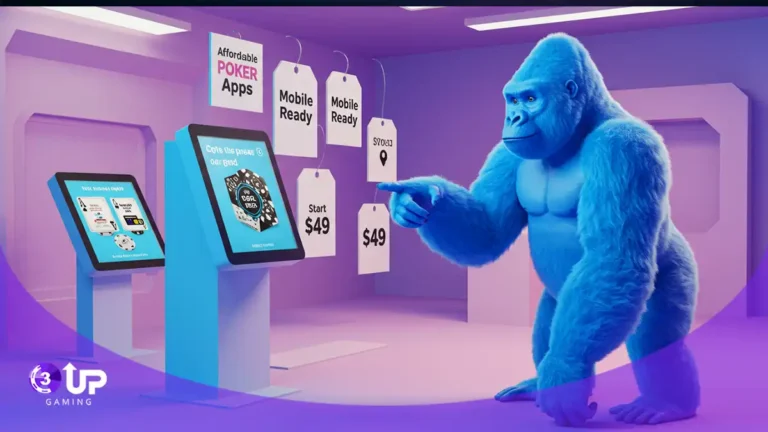Poker Site Rules Regarding the Use of RTA Software! Most major online poker sites in 2025 have strict policies against the use of Real-Time Assistance (RTA) software during active gameplay. RTA tools, such as solvers or strategy guides that give decision-making advice while a hand is being played, are considered cheating by virtually all reputable platforms.
Sites like 3UP GAMING, PokerStars, GGPoker, partypoker, and 888poker have implemented advanced detection systems and maintain zero-tolerance policies. Players caught using RTA during live games risk severe consequences, including permanent bans, confiscation of funds, and blacklisting across networks.
These sites typically differentiate between training software and live assistance tools. Using solvers like PioSOLVER, GTO Wizard, or Simple GTO Trainer for off-table study and hand review is generally permitted and even encouraged. However, running these tools or referencing charts during a live hand is a direct violation of most terms of service.
To stay compliant, players should always review each platform’s policy on third-party software, usually found in their responsible gaming or fairness sections. If you’re serious about long-term success, it’s best to focus on ethical improvement and use RTA tools only for post-session analysis.
What Is RTA (Real-Time Assistance) Software in Poker?
Real-Time Assistance (RTA) software is described as a tool that assists players in making better strategic decisions during gameplay. In contrast to post-game solvers or training tools, RTA assists on the spot as the hand unfolds, acting as a real, breathing coach who examines live ranges, actions, and probabilities as the action unfolds.
RTAs use complex algorithms and preflop game theoretic optimal charts to guide players in poker. Some are automatic, while others require manual input.
Some argue that RTAs diminish human instincts and computer computation, negatively impacting competition in games offering real cash for tournament winners or cash games. This could diminish a player’s skill and negatively impact the game.
Most, if not all regulated poker sites refer to RTA as a kind of cheating because it gives the player an unfair advantage driven by a machine. Also, it also presents a serious challenge in terms of detection and enforcement because the really advanced RTA can run under disguise with the poker client and not appear suspicious at all.
In short, strategy tools and solvers are part of the poker learning and growth process; however, the RTA crosses a line by removing the player’s control during live play, threatening the fairness and sustainability of the online poker environment.
Why Most Poker Sites Ban the Use of RTA Tools
RTA is illegal at most online poker rooms as it compromises the games’ integrity by giving a player an unfair edge.
RTA in poker delivers real-time, mathematically perfect suggestions and the human element is taken away making it server vs. player
The typical example is some people actually use commercial grade software and turn the game into a server vs player game. This is against most poker rooms policies keeping a fair and competitive poker environment hard to maintain.
Game integrity is key to trust between recreational and serious players. Mistrust in AI led play can lead to system liquidity issues and long term damage to player base and site bottom line.
The major sites on the APAT blacklist are now actively implementing policies against cheating third party software and questionable activities.
RTA is designed to be unfair, and prey on weaker players and like most things, it spreads like wildfire across the table.
There will be a better way by 2025, but as long as online poker rooms crackdown on stricter verification, it will be hard for cheats to cheat without ending in court, losing their license or going out of business in the field of verification.
Sharpen your tactics with: Rent a Poker App: Flexible & Cost-Effective Solutions
Common Anti-Cheating Policies Related to RTA Software

Online poker sites ban Real-Time Assistance (RTA) tools and cheating by including monitoring clauses in their terms of service and EULAs and by actively blacklisting software.
Monitoring clauses in the Terms of Service and EULA allow them to monitor user processes, scan memory and scan software while playing. They can identify irregular players based on player inputs and patterns with AI-assisted decision making.
Sites have a software blacklist, a list of prohibited tools that offer real-time strategic benefits. These tools can track opponent stats, analyze hand histories and provide outputs based on solver metrics. Some blacklists are public, some are secret and require removal by the site.
Among these are:
- PokerStars’ security policy, bots and RTA suppression with behavioral analysis.
- GGPoker’s integrity team, they sometimes refund users if they get victimized and remove the perpetrator.
- PartyPoker’s extensive surveillance, looking for any signs of outside decision-making assistance.
These are absolute must to make sure poker can just stay as close to a human game. These days they are serious, any account caught with RTA is usually banned outright, sometimes with funds confiscated as well.
How Poker Platforms Detect RTA Usage

Modern poker sites have multi-layered detection systems to catch Real-Time Assistance (RTA) software. These include client-side tools, behavioral analytics and external reporting to ensure integrity across their networks.
Client Monitoring
Poker software has anti-cheat modules that monitor your system during play. These modules can detect:
Other applications running in parallel (e.g. solvers or AI tools)
Memory injections or script overlays
Keypress timing and input rhythm
These tools run under your consent as outlined in the Terms of Service. Most of the time you agree to local client scans when you launch the game.
Behavior Analysis
Even if software evades detection, behavioral analytics can catch you. Sites track every decision you make and compare it to known human patterns. Red flags include:
- During lengthy sessions, near-perfect game theory conclusions are made.
- Inhuman response times or consistent betting methods
- Anomalous win rates are inconsistent with your account history.
Machine learning systems analyze this data in real time to identify accounts that match RTA profiles.
These profiles are based on known cheats and solver results.
Third-Party Reports
Some sites use community reporting and whistleblower tools. Players can flag opponents and it will trigger an investigation. In high stakes games top pros often notify the site directly when they suspect solver usage.
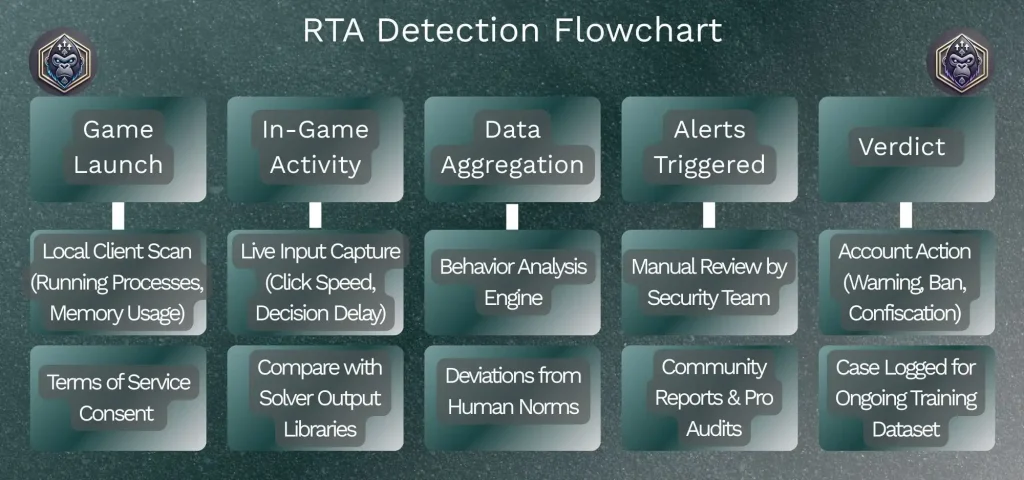
Want smarter decisions? Why Bitcoin Poker UI Wins Big in 2025
Consequences of Using RTA on Regulated Poker Sites
There are significant dangers associated with employing Real-Time Assistance (RTA) software on regulated poker sites, and those dangers increase the more frequently a user employs such software. These dangers are in place to preserve the integrity of the games.
The majority of poker sites are licensed and need to comply with rigorous anti-cheating policies. The use of RTA tools represents a violation of the terms of service, and depending on the policies of the site, you may incur different punishments.
First time offenders may receive a warning or a short suspension if the violation is minor, or the tool is borderline. But even minor infringements of restricted software can result in instant account suspension.
In high stakes or cases of repeated misuse, permanent bans are the norm. Such bans may be accompanied by fund confiscation, damage to reputation, and being placed on multi-venue watchlists which restrict access to other major sites.
There are sites that forfeit users’ RTA accounts for future RTA detection. This shifts the risk versus reward balance for players who RTA.
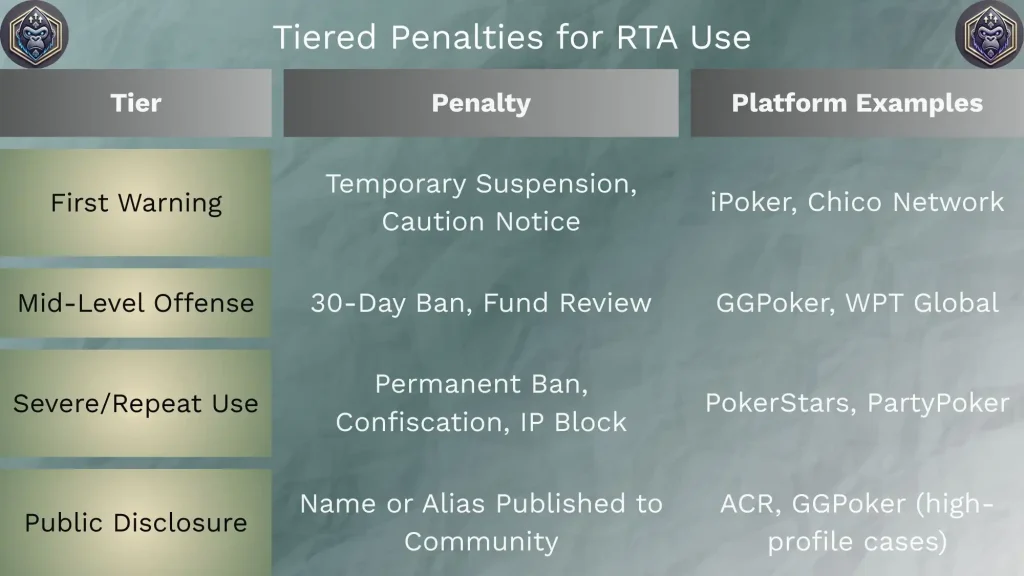
While some platforms maintain zero-tolerance policies to set precedents in public, others enforce them covertly.
Capture what you need with: Secure Bitcoin Poker Sites You Can Trust in 2025
Examples of Poker Sites That Have Banned RTA
Online poker tools such as RTA software have been the subject of public calls from a few poker sites with updated rules and heavily enforced bans. It’s just a few examples of the industry putting a stronger emphasis on playing fair and clean.
Throughout its history, PokerStars has generally taken a conservative approach when it comes to real-time tools. However the software they’ve banned has become broader since their policy change in 2019 including any software that gives advice midgame. A few users were lucky enough to get it before they were disabled in the 2018-2019 machine update.
GGPoker got very aggressive in 2020 when they banned over 40 accounts and took away $1.2 million USD. They have declared an official war on solvers and RTA and use AI detection and behavior tracking methods.
Party-poker has both humans and automated systems looking for cheating. They’ve nixed thousands of accounts between 2018 and 2021, a portion were for software violations dealing with RTA.
The CEO of Winning Poker Network (ACR) has clarified with their technology to only allow something that enhances your in-game experience and they have gone so far to remove some ACR user accounts as per his Twitter.
These are only a few examples of the growing trend towards transparency and enforcement via technology.
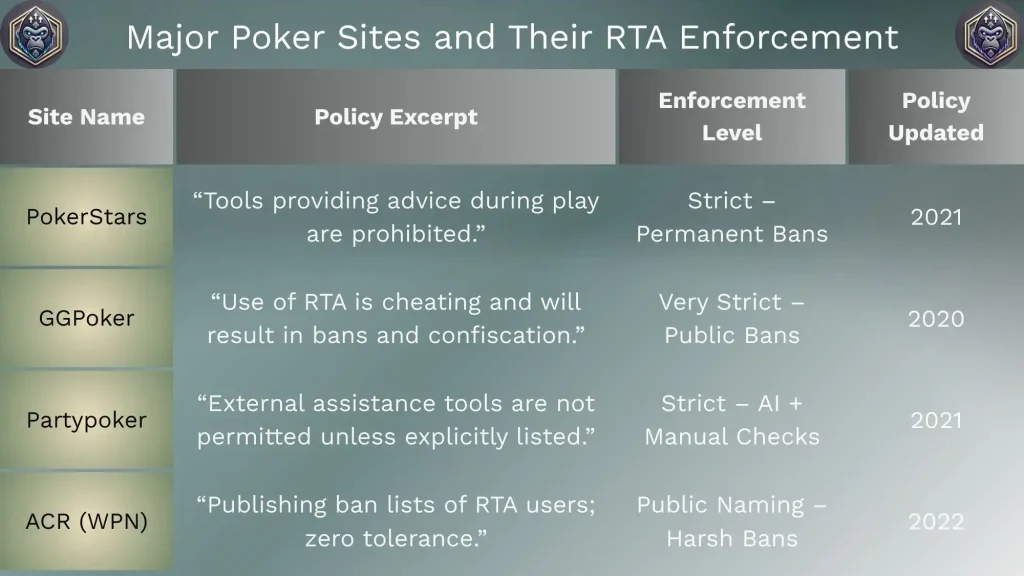
Boost your game with: How Poker NFT Characters Earn You Passive Income
As we covered in: Unique Traits That Make Poker NFT Characters Stand Out
Legal vs. Illegal Poker Tools: Where RTA Stands
Online poker websites have been grouping third-party software into three categories; allowed, grey-area and banned. To get an idea of where RTA falls on that scale it’s worth considering this rough classification that is a bit different on every site but has core Similarities.
Educational Tools
Passive applications that are used outside of live play. i.e.:
- Hand history trackers looking at your old sessions
- Equity calculators and solvers that are used after hands are finished
- Bankroll management software
These are the only kinds of tools that are legal for use and do not talk to you in real-time, tell you what to do, or inject into.
Tools In The Grey Area
Some poker tools rely on how they are utilized, being good or tools in the gray area:
- HUDs (Heads-Up Displays) – Allowed is ACR – but not allowed on GGPoker
- Poker charts or push-fold charts sometimes are ok as static resources but not applicable if they change during the game.
What and when it’s used are factors to be considered for some of these tools to be marked as cheating.
Cheating Tools
RTA software is in the group of banned tools. For example, these are applications that are analyzing currently in progress hands and suggesting you the perfect moves as it happens.
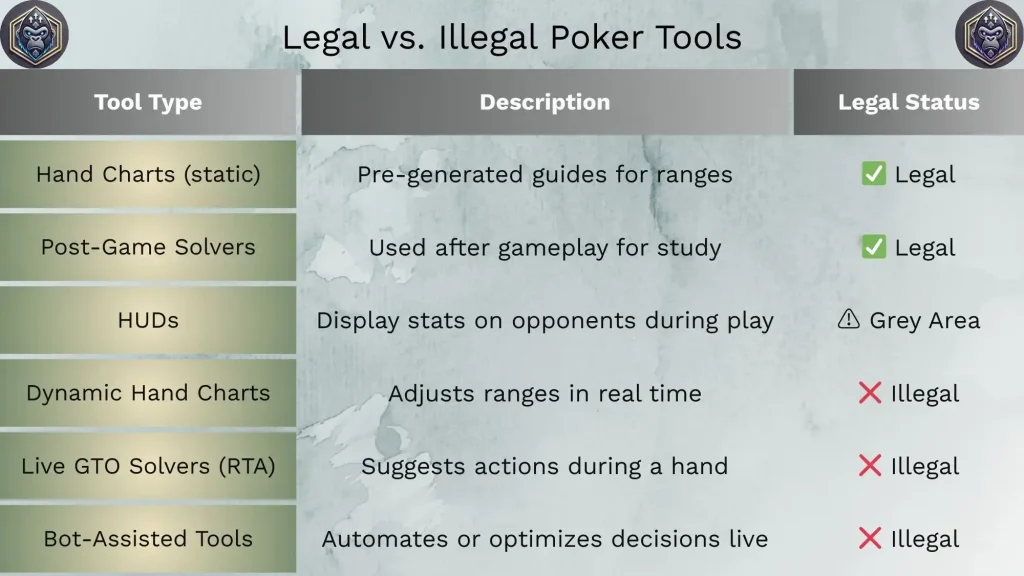
They usually have bot integration, automated decision engines or live solvers which are all clear violations of fair play rules.
What Poker Sites Consider “Assistance” Software
Most poker software sites describe “assistance software” as any third-party tool that provides help in decision making while playing.
Tools that make suggestions, calculate the most perfect strategy as each hand is played, or influence which hands players will choose during an active hand qualification.
On sites like GGPoker and PokerStars, tools that are not allowed include those that “reduce the human element of decision making,” as announced in their terms of service. Thus, real-time solvers, bot overlays, and even minor apps such as auto-fold suggestions or dynamic equity calculators that update as cards are dealt can be restricted. There are a few gray areas.
For instance, pen and paper printouts or static push-fold charts are generally considered acceptable, as are calculators that can run while offline. However, if you use a tool that provides real time odds while an active game is running and updates when cards are shown.
Use a real time hand adviser on all streets even when you’re not in the hand yourself and this is a breach of the rules.
What it ultimately comes down to is whether the software changes or guides the decision-making in a given hand. If it replaces the need for critical thinking while hands are in play, it’s likely always considered real-time assistance (RTA) and not permitted.
To make sure you aren’t violating any rules, players need to consistently review what their chosen sites own policies are and when unclear rather be open about what tools are being used.
Don’t miss this: Full Comparison of Top Poker Bots in 2025
Explore further: Affordable Poker Apps for Sale: Your Gateway to Gaming Biz
How to Stay Compliant with Site Terms of Service
Checklists
Every serious poker player should have a personal compliance checklist. Before you start any session check that no third party tools are running in the background.
This includes browser extensions, software plugins or even screen sharing apps that could be seen as unfair aids. Many sites have their own compliance checklists, like the “Permitted Tools Guide” on PokerStars which should be reviewed regularly.
Update Notifications
Poker site policies change. A tool that was allowed last year may be banned today. Enable notifications for policy updates via email or in app and subscribe to operator blogs or forums for patch notes and enforcement news.
GGPoker for example updates their fair play policies regularly and expects users to comply immediately after changes go live. Missing an update is not an excuse during enforcement.
Tool Vetting
Before you use any software during play, vet it against the poker site’s current TOS. If a tool isn’t clearly listed as allowed, reach out to the site’s support team for written confirmation. If in doubt, disable the software.
Some sites even allow you to submit tools for pre-approval. Always prefer tools with a good reputation and community trust like PokerTracker (for analysis not live play) or ICMIZER (outside session play).
By combining these three you can significantly reduce the chance of unintentional infractions and be seen as a fair and compliant player: checklists, update monitoring and proactive vetting.
More on that in: The Best Online Poker Bots Used by Pros
Ethical Poker Play vs. Exploitative Software Usage

Self-Regulation
In our era of technological advancement, self-regulation is the starting point of ethical poker play. Just because you have the tools does not mean they must be utilized during the game. RTA software that is done manually in a game of poker is done automatically using software which removes the game.
Ethical players perform self regulation by deciding the analysis is for study sessions not for making real time decisions during a game. It takes self control to have integrity even when the rules are not clearly defined.
Community Impact
The use of RTA software in poker brings negative consequences the entire community suffers. Casual freshly registered players which are the blood of poker leave, trust diminishes and win rates become unbalanced.
The amount of cash on the platform, attendance in tournaments, and the overall value of the platform is all heavily impacted. It is important to note that liquidity is mostly affected. RTA software helps sustain balance in fair competition between amateurs alongside grinders.
Maintaining the long-term health of the game is just as important as cleaning and organizing the boards, groups, or forums.
As stated previously, ethical poker play is not limited and confined into a box of rules. Instead, it has different angles to explore competing through patience, wit, along with pattern recognition which put the human element above mere trickery.
Putting trust in the game means to choose the tougher path when it is apparent they ought to do so.
Don’t miss this: What Is Multi-Table Poker Software and Why Do You Need It?
Take control with: How to Start an Online Poker Business in 2025?
FAQ: Poker Site Rules Regarding the Use of RTA Software!
What do poker sites classify as RTA software?
RTA software is defined by poker sites as any program that deliberately or subconsciously makes a determination for you how to play your hand in actual play, this includes GTO solvers and bots.
Is RTA banned on all online poker platforms?
On most regulated poker platforms RTA software is explicitly prohibited Although RTA Monitor on unregulated or offshore poker sites can be either spotty or non-existent, the use of such software is risky and regulated software terms are often violated when doing so.
What happens if you’re caught using RTA on a poker site?
Players caught using RTA software can expect warnings, suspensions, account banning, and sometimes funds being seized if caught. Consequences are based on the type of offence, the intent and how strong the poker rooms cheat detection policies are.
How do sites detect the use of RTA tools in real time?
The way this software is found is through in-game software monitoring on the client-side, AI-based behavior analytics and reports from players. Automated alerts are triggered for exceptionally accurate decision making, or consistent solver-caliber play.
Are all strategy tools considered illegal?
No, Many sites allow strategy tools so long as you are not using them in live play. Real-time advice tools during hands are the ones that are banned, not the ones that are used after hand is over for review or training.
Can your account get permanently banned for RTA use?
Yes, It is incredibly common for players to be permanently banned when caught using RTA software, especially on regulated poker platforms. On follow up offenses or with more complex assistance tools come more severe repercussions which often include the total loss of funds deposited.
Do poker sites publicly share lists of banned software?
Some sites PokerStars, and partypoker are very forthcoming with publication rules and blacklists. Other sites stick with policy lingo or keeping players in the loop through updates directly or at all.
What are some legal alternatives to RTA software?
Lawful tools include in-game HUD’s when permitted, databases of hands to be used outside of games for number crunching or pattern finding, trainers for working on poker play, and even solvers that are educational platforms.
Is using hand charts or solvers during play considered RTA?
Yes, Static charts even if they are used only for preflop situations might be considered RTA if being used to help you determine what you should do during live play so tread lightly. Some sites take basic preflop charts in stride but proper RTA software is typically forbidden.
How can I make sure my tools comply with poker site rules?
Looking at the terms of service or talking to site representatives, avoiding software when you play in a hand, and asking help desk directly about questions about legality. Regularly check policy updates to stay compliant.





